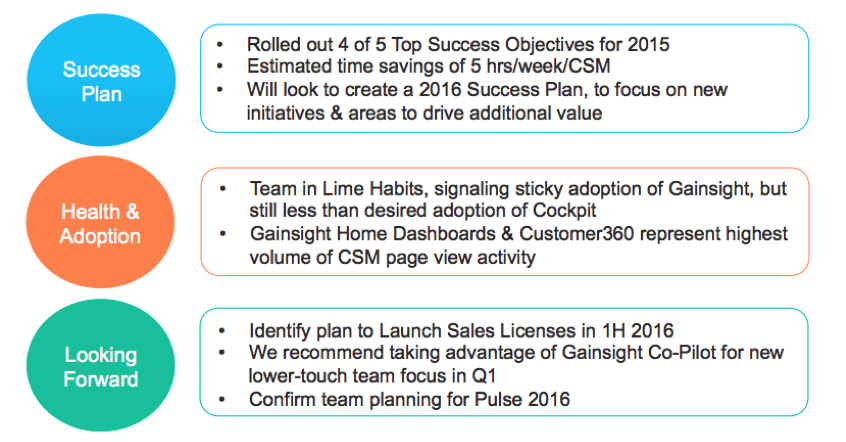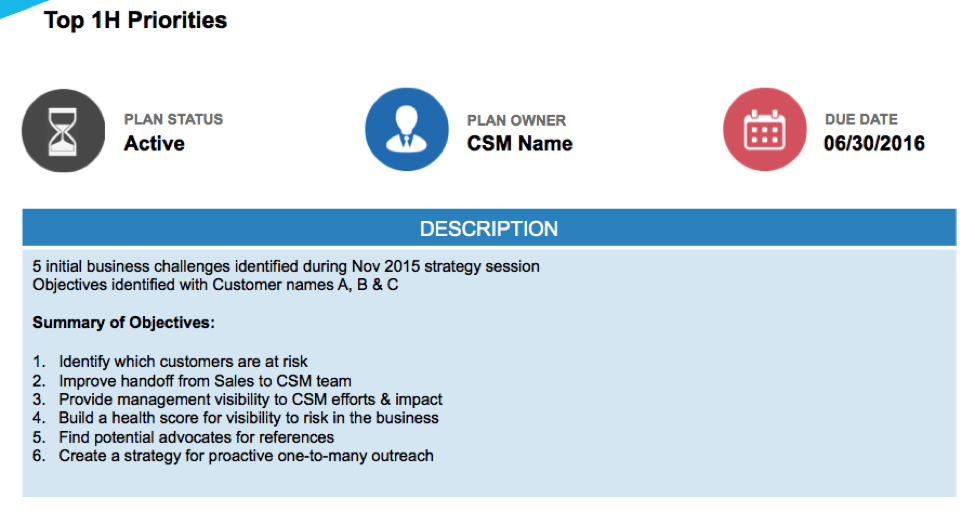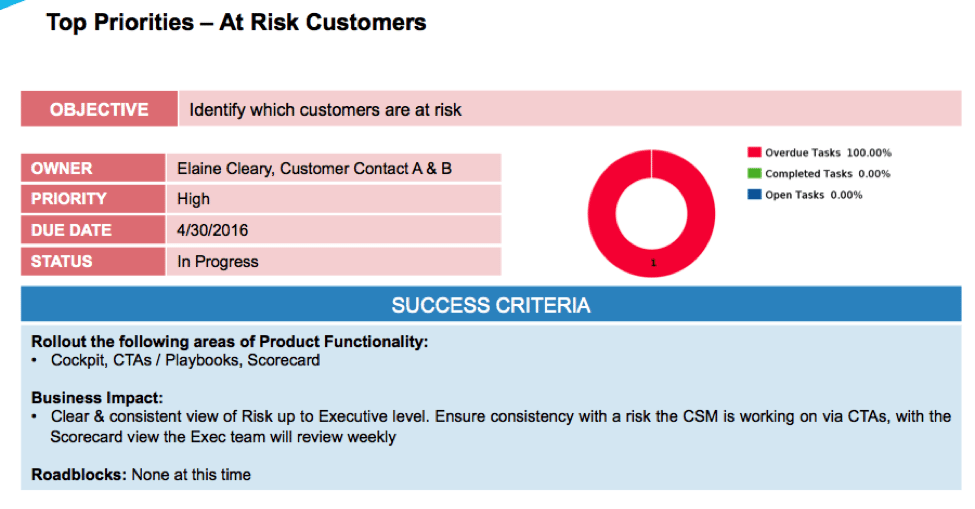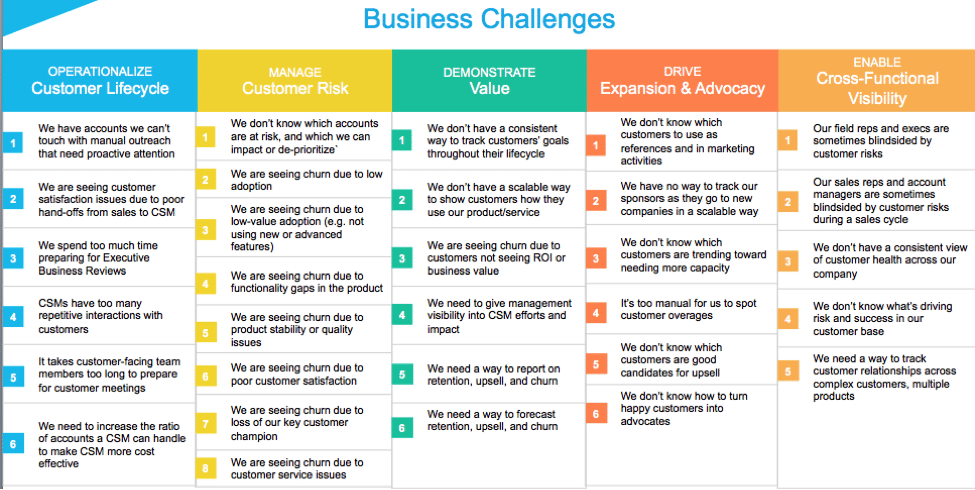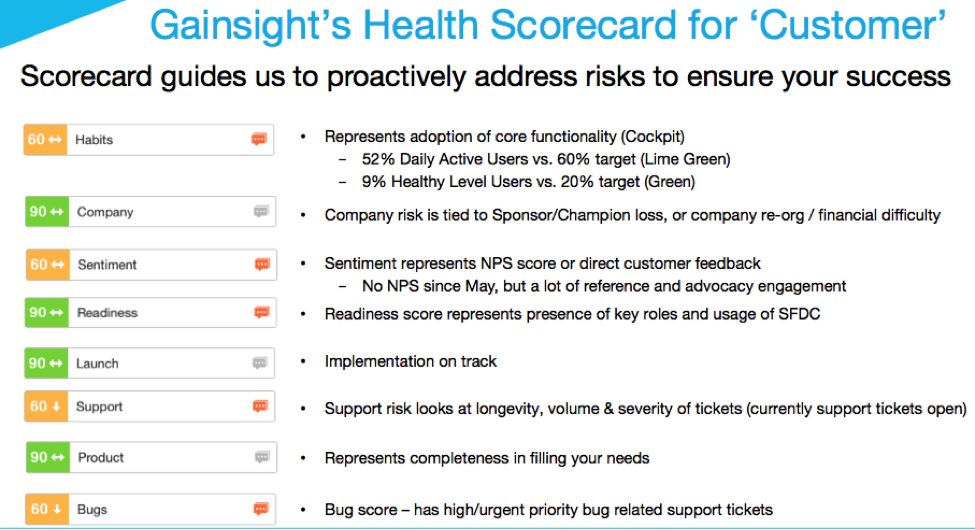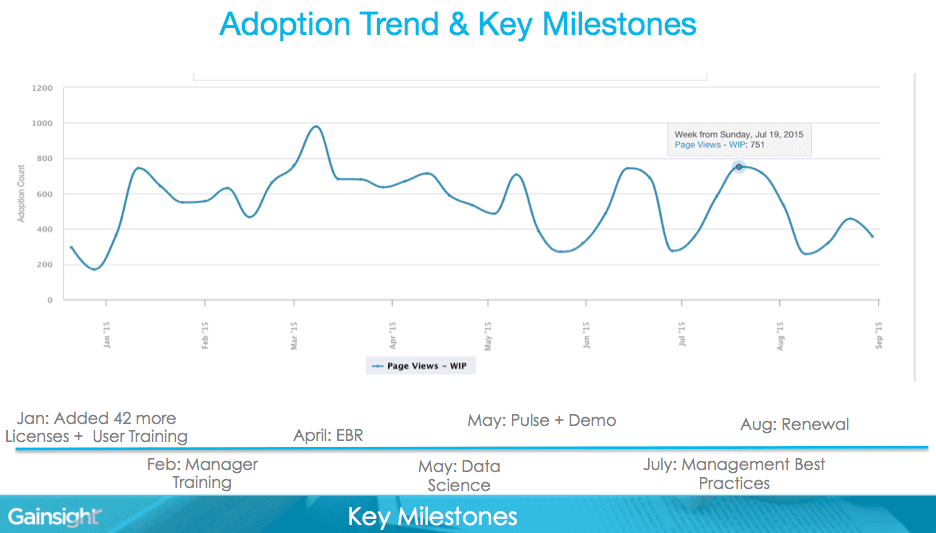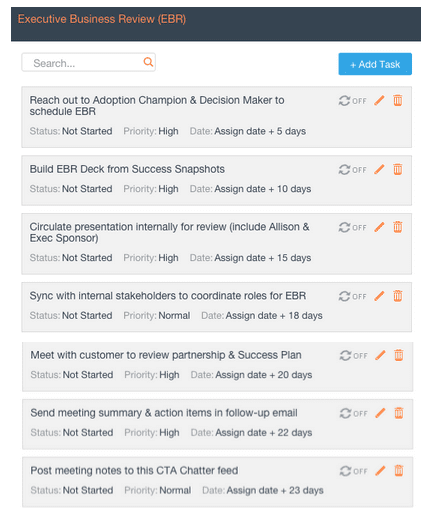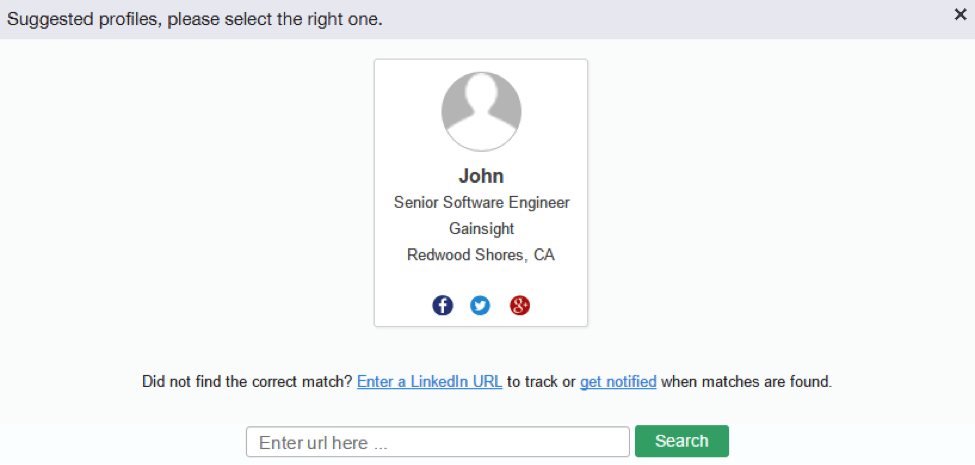Allison Pickens is VP of Customer Success & Business Operations at Gainsight. Thanks to Kelly DeHart (Director of Customer Success) and other team members for contributing to this blog post and creating some of the processes we’ll describe below.
Note to Gainsight Customers: This post contains links to Vault Assets you can import directly into Gainsight.
Do these scenarios sound familiar?
- The exec at a customer tells you s/he loves your product, but your CSM says that the junior day-to-day lead hasn’t made any progress with it.
- Your CSM thinks the customer is making a ton of progress with your product, but the exec emails you and says they’re not getting value.
Both of these scenarios are troubling. In the first one, it’s only a matter of time before the junior lead tells the exec that it’s not worth renewing your contract. In the second, it doesn’t matter whether the customer is making progress “in reality”, since what really matters is the exec’s view of reality.
It’s critical to create alignment across the people at the customer. After all, “the customer” is really just a collection of people, all of whom have different personalities, opinions, and influences over whether “the customer” becomes successful, renews, and recommends your product.
In this post, I’ll share how we engage with executives, to ensure that our customers stay on track.
METHOD 1: Executive Business Reviews
We schedule Executive Business Reviews at regular intervals. The purpose of an EBR is to:
- Recap the value that the customer has achieved by using Gainsight
- Discuss how the customer can achieve even more value
We cover the following topics:
(1) Introductions and Company Updates:
On the first slide, we share the name and title of each participant in the meeting. This includes members of the customer and Gainsight team members. We make sure to invite not only the Exec Sponsor but also the Adoption Champion(s) (our term for the leader of a Customer Success team, often director-level) and the Gainsight Administrator (often an operations leader). The goal is to ensure that key influencers at the customer are in the meeting and are aligned on the takeaways coming out of the meeting.
The next 4 slides recap Gainsight’s progress as a company since the last EBR. The goal is to reassure the customer that they’re working with a best-in-class organization that has the desire and ability to be their long-term partner. Our Product Marketing team provides slides that show:
- Some of the customers we’ve sold to, and the percentage of large-cap software companies, publicly traded cloud companies, and “unicorn” private cloud companies that are Gainsight customers
- The growth in our organization; a chart shows number of employees over time
- Our thought leadership and best-practice resources the customer can access, including our Community, our Blog, and our Webinars
- Our Pulse conference
(2) Executive Summary
It’s important to highlight the overall takeaways from the presentation upfront. Executives often have short attention spans (certainly, I am guilty of this!), so we aim to get straight to the point, and then dive into the details later in the deck.
Here’s an example of an Exec Summary slide. The 3 components correspond to the 3 sections of the overall deck.
(3) Success Plan
We align our Success Plan process with our EBR process. Each Success Plan is intended to cover the period between EBRs. So at each EBR, we review progress made on the past period’s Success Plan, and then gather input to create a Success Plan for the next period.
We export the active customer Success Plan from the Customer360 and include it in our EBR deck to help drive this portion of the discussion. In this section we include (1) Success Plan summary slide which outlines the list of Objectives we’ve been working towards, (2) the more detailed Success Plan objective slides covering each objective in the plan, and (3) a slide to highlight timeline & status of each objective.
After the review of the existing Success Plan, we include a slide on core Customer Success Business Challenges. This slide helps guide discussion with the Exec, ultimately resulting in selection of the next core objectives to work towards. Following the EBR, the CSM will create a new Success Plan that includes the refreshed objectives.
(4) Health & Adoption
It’s critical for us to ensure alignment with the customer on the health of our partnership during the EBR. In the spirit of transparency, we share our view of the customer’s health by revealing our Gainsight Scorecard to them. We review each scorecard measure & highlight our justification for considering them as Red, Yellow, or Green. We also look to get buy-in from the customer regarding whether they agree with our assessment, or have a difference of opinion. This is a great way for us to ensure we’re on the same page, as well as to expose any gaps which need to be addressed.
In this section, we also drill down into the customer’s adoption of Gainsight (essentially a double-click into the ‘Habits’ measure of the scorecard). We include a slide on overall usage trending, which allows us to look at adoption of various parts of the product over time.
Lastly, the CSM will include any additional slides which are necessary in order to provide greater detail into a scorecard measure that is critical to the customer. Examples of this would be a detailed slide on a customer’s core product enhancement asks, or an overview of top priority support tickets.
(5) Next Steps
Before the EBR, we’ll create a slide to capture next steps that we recommend coming out of the meeting, but we will also edit that slide during the EBR to record feedback from the customer.
After the EBR, we’ll write an email that reminds the team of the next steps and includes a screenshot of the new Success Plan that we agreed to during the meeting.
EBR Frequency:
The frequency of the EBR depends on which Customer Success/Support package the customer purchased:
- Premier+: 4x per year
- Premier: 2x per year
- Standard: 1x per year
(These packages are approximately correlated to the size and lifetime value of the customer. We’ll write more about our Customer Success packages in a later post, but in the meantime you can learn about Customer Success business models here.)
We created Lifecycle Calls to Action (CTAs) to remind us to schedule these EBRs. Here’s the Playbook for the EBR:
METHOD 2: Sponsor Tracking
One of the top causes of churn for most vendors is a change in executive leadership at the customer, which often results in a change in strategy and/or a change in preference for software vendor. It’s critical to regroup quickly when this happens. You can improve your reaction time by tracking whether each executive sponsor has left the customer.
To this end, we use our Sponsor Tracking functionality in the Customer 360 dashboard.
Sponsor Tracking is an out-of-the-box feature that incorporates data from a variety of professional networks. Users can easily identify sponsors from the Customer 360 page and will be alerted any time the Sponsor changes job title, company or location. This allows you to mitigate risk with that customer, and identify new opportunities in the sponsor’s new department or company
A user can select a Sponsor from their list of Contacts, and Sponsor Tracking will suggest a matched profile.
A user can easily see which Sponsors are being tracked from the Customer 360. When a sponsor changes, you can trigger a CTA to be created with an associated Playbook for the CSM.
METHOD 3: New Sponsor Process
You’ll also need a process for what to do once a new executive has replaced the prior one. We have a New Sponsor Playbook that guides our CSMs in ensuring a successful transition. We cover 4 topics during a series of meetings:
- Introduction to Gainsight & Partnership Overview: We review our partnership to date, assess the exec’s familiarity with Gainsight, and discuss at a high level how the team is using the product. This conversation may lead into a full demo of Gainsight.
- How a VP of Customer Success Uses Gainsight: Best-practice discussion about how I use Gainsight to run the team. This session helps us explain how Gainsight is relevant to the exec personally in his/her role, not simply to his/her team members. (You can read more about how I use Gainsight here.)
- Strategy Alignment Overview: We want to make sure that the work we’re doing with the exec’s direct reports is aligned with the exec’s strategic objectives. Coming out of this session, we create a new Success Plan for that exec.
- Overview of Gainsight Instance: We get the exec up to speed on what his/her team has already configured in Gainsight at a detailed level.
Read more about our New Sponsor Process here.
METHOD 4: Executive Sponsor Program
Our VPs and other senior leaders from across departments at Gainsight are assigned as Executive Sponsors to accounts above a certain ARR threshold. They are assigned CTAs to remind them to check in with the customer execs every so often.
The primary purposes of the Exec Sponsor Program are two-fold:
- To uncover latent challenges in our larger accounts
- Higher ARR or brand value means that more management attention is needed.
- To support effectively our largest accounts, more intimate knowledge of the account is required than CSM team leaders generally have the bandwidth to acquire.
- To give Gainsight executives across departments exposure to real customer issues in depth. This awareness helps our VP of Product design better products, helps our VP of Sales design a better sales process, etc.
Read more about our Exec Sponsor Program here.
METHOD 5: Implementation Updates from Onboarding Project Manager
We send regular updates to the exec to keep them apprised of progress during onboarding. Onboarding is a critical time in the lifecycle: If it goes well, the customer is likely to remain a healthy customer; if it goes poorly, it can be costly to get the customer back on track later.
Sometimes onboarding doesn’t go well because the customer hasn’t dedicated the right resources. That one reason why it’s important to stay in close touch with the exec — so that you can work with him/her to assign the right people to the project.
Premier+ Customers
Currently, for customers with custom implementation SOWs, the Project Manager sends weekly updates to the Adoption Champion, copying the Executive Decision Maker (Adoption Champion is our term for the mid-level person at the customer who is most responsible for encouraging adoption of Gainsight at the individual-contributor level; often it’s a team director.) The update includes progress made during the week relative to the project plan that was aligned on at the start of the engagement, implementation steps for the next couple of weeks, key risks to meeting those milestones, and important decisions to be made next week.
We put the Adoption Champion in the “To” line and the Exec in the “CC” line because we want to empower the Adoption Champion to take ownership of the project from the customer’s side.
For customers that select our Express onboarding process, we review their project plan during the weekly status calls with the customer, we share a self-service version of the project plan so that they can monitor their progress, and we are in the process of deploying a new “External Collaborator” functionality to encourage self-service knowledge share / updates.
If any red flags are raised within or in response to the PM updates, the CSM will check in with the Executive directly to understand their sentiment and align on go-forward plan as needed.
Premier Customers
Same as for Premier+.
Standard Customers
For customers that select our Express onboarding process, we review their project plan during the weekly status calls with the customer, we share a self-service version of the project plan so that they can monitor their progress, and we are in the process of deploying a new “External Collaborator” functionality to encourage self-service knowledge share / updates.
If a customer is considered “at-risk” during implementation, the Project Manager sends an email update on progress to the Executive on a monthly basis.
METHOD 6: Regular Updates on Success Plan from CSM
Premier+
Our Success Plans tackle business objectives that span anywhere from a quarter to a year, with clearly defined monthly or quarterly deliverables, based on the planning and execution cycle at the customer’s organizations. In addition, we create turnaround Success Plans for our at-risk customers which are shorter-term and more tactical in nature. We provide live updates on a monthly basis (e.g., on weekly check-in calls with the Adoption Champion or by email) to ensure we are aligned on progress towards our goals.
Premier
Our Success Plans tackle goals over a 6 month period of time, based on the Executive’s vision & objectives. Goals are set at the beginning of the partnership, and reviewed in depth every six months via our EBR process. We also provide Success Plan updates on a quarterly basis to ensure we are aligned on progress towards our goals – these updates are provided via email from the CSM to the Exec and contain an export of the actual Success Plan from Gainsight.
Standard
We currently create Success Plans for at-risk customers. We are planning on automating this process to create Success Plans for all customers during the sales cycle that will then serve as an input into their implementation. We review Success Plan progress during EBRs once per year. Finally, we are exploring sending CoPilot email updates on Success Plan progress to execs very 6 months.
METHOD 7: Updates from CSM during Risk Situation
Premier+
In cases of rare extreme risk, (e.g. systemic failure or workflow stoppage), we provide updates every 4 hours to our execs, or more frequently whenever possible. However, in less extreme cases, the updates are daily, twice a week or weekly depending on the severity of the risk.
Daily updates are provided for the flagged risks:
- Support Risk: Major support issues resulting in workflow stoppage (Update provided by Support Director)
- Bug Risk: Majors bugs for which there is no immediate or planned solution (Update provided by Support Director)
- Launch Risk: project related risks that will shift an imminent go live date (Update provided by Project Manager)
In these cases, the internal risk owner who updates the customer will copy the CSM on all emails. The CSM will escalate internally if the risk management goes off track. Once we believe the risk has been resolved, the CSM coordinates a meeting with the Executive and the internal risk owner, to ensure everyone agrees the issue has been resolved.
Bi-monthly updates are provided for the following flagged risks:
- Sentiment, Habits, Product, and Company Risks: Update provided by CSM, except in the cases of complex product enhancement requests, in which case the Product team quarterbacks the effort and provides updates.
In the case of those types of risks:
- CSM will schedule meeting with the Executive to discuss source of concern or issue, and agree on a path forward
- CSM will identify and document the steps needed to correct, via a Success Plan that is shared with the customer
- CSM will communicate updates to the customer against the Success Plan twice-monthly (until issue is brought to resolution)
Premier
Same as Premier+.
Standard
The CSMs that work with Standard customers are primarily focused on providing updates on flagged risks relating to Habits, Company, or Sentiment Risk. Given that account ratios are higher in this part of our business, our CSMs spend less time coordinating with other departments on the risk categories that those departments manage (e.g. Implementation Risk or Support Risk).
- Habits Risk: When customers are in Red or Orange Habits (low adoption), we email execs to inform them of their team’s low usage, understand why, and align on a path toward greater adoption.
- Company Risk: When customers have a change in a core role, we email execs immediately to understand the plan / timeline for re-hire and to get an introduction to the new contact. If we experience an exec sponsor change, we work with our adoption champion to get an introduction and meeting with the new exec as soon as possible.
- Sentiment Risk: When customers express poor Sentiment (e.g. through a low NPS rating), we work with execs to identify the root cause and address their concerns.
METHOD 8: Exec Escalation
When a customer issue is so significant that they email me or our CEO, we take it very seriously. We’ve developed a process to handle these situations so that we can reach resolution as fast as possible and ensure no balls are dropped.
- Receive concerned email from a customer. I (or our CEO) forwards it to our CSM Team Lead.
- CSM Team Lead opens a manual “Executive Escalation” CTA and assigns it to an Escalation Manager based on customer context and technical complexity. This can be either our Director of Support, Director of Services, or CSM Lead.
- Escalation Manager takes lead on our Executive Escalation playbook. The tasks for this playbook are:
- Define criteria for closure upfront
- Define frequency of internal and external updates (hourly/daily/weekly)
- Provide internal updates to chatter and external updates to customer
- Confirm with customer that escalation is closed
- Send gift to customer on behalf of CEO or myself, to remind the customer how much we appreciate their partnership.
METHOD 9: Director Check-in’s
Even though your CSMs are engaging with execs at your customers, it’s important for their managers to do the same. There are 2 reasons:
- Your exec sponsor may be more willing to share certain feedback with someone senior than with your CSM. (That said, we seek to create a strong line of communication at the CSM level, to ensure a more scalable way to gather and respond to feedback.)
- It’s critical for team leaders to hear from customers firsthand, to boost their awareness of what’s going on in their customer segment.
Premier+
When a customer is new to the Gainsight relationship, the Gainsight team director connects with the executives/directors once every two weeks for 20 minutes to discuss:
- Pulse check on the implementation/rollout
- Change management and adoption in your team
- Sharing best practices from other customers on specific topics
- Special topics (e.g., events and speaking engagements, dashboards)
After the first 6 months, we move this to a monthly cadence of check-ins.
Particularly in our large accounts with many stakeholders, we take a “peering” approach, in which our directors align with most senior people at the account, and the CSM aligns with the next level down. This helps us improve our coverage.
Premier
The team director sends an email to customer execs quarterly, aimed to solicit feedback on progress, our team, and product. The email is sent via Co-Pilot to 10 customers a week throughout the quarter, giving leverage to the director.
Standard
Same as Premier, but every 6 months, and the email is sent to 25 customers a month.
METHOD 10: VP Check-in’s
I personally aim to engage with 15 executives at our customers every week, whether over email or by phone. I ask my team directors to send me a list of 15 executives to contact. In situations where the CSM has asked me to gather specific feedback or encourage the customer to take some specific action, I’ll create a customized email for each exec. But in most cases, I’ll simply say:
“I just wanted to check in and see how things are going. Let me know if I can remove any roadblocks or trade notes on a topic that’s top of mind for you. I’m happy to hop on a call if helpful.”
Open-ended questions allow the customer to ask for the type of support that’s most helpful to them.
In addition, blog posts like these help me stay in touch with execs in a one-to-many way. Our CEO Nick also plans this year to engage with CEOs at our customers through regular one-to-many email communication and blogs on how he uses Gainsight as a CEO.
BONUS METHOD: Track Executive Usage
We track Executive adoption of Gainsight with an “Executive Engagement” Scorecard. Currently, we have two measures in this Scorecard, one to track Exec Dashboard Usage and the other to track Exec C360 usage. Usage in these features can indicate their using Gainsight to track team metrics, lead meetings, or prep for important customer calls. We also hope to introduce measures to track Exec advocacy and event attendance.
If you’d like to learn more about how to implement these processes in your organization, check the Business Processes section of Gainsight Go, check out the Gainsight Vault, or contact your CSM. You can also send questions or feedback to Allison at apickens@gainsight.com. Follow her blog posts on Twitter at @PickensAllison.
Vault Assets mentioned in this post
(for Gainsight customers only)
Here are ready-to-use versions of what you’ve seen in this post:


